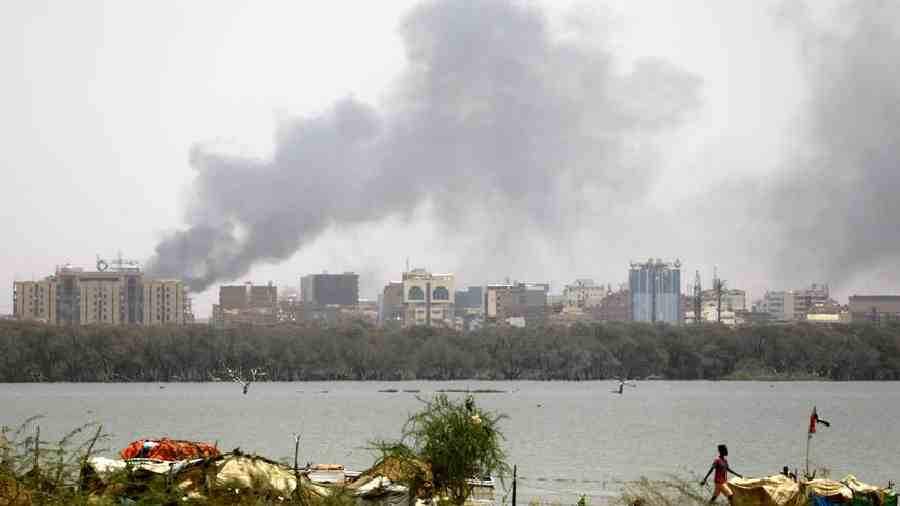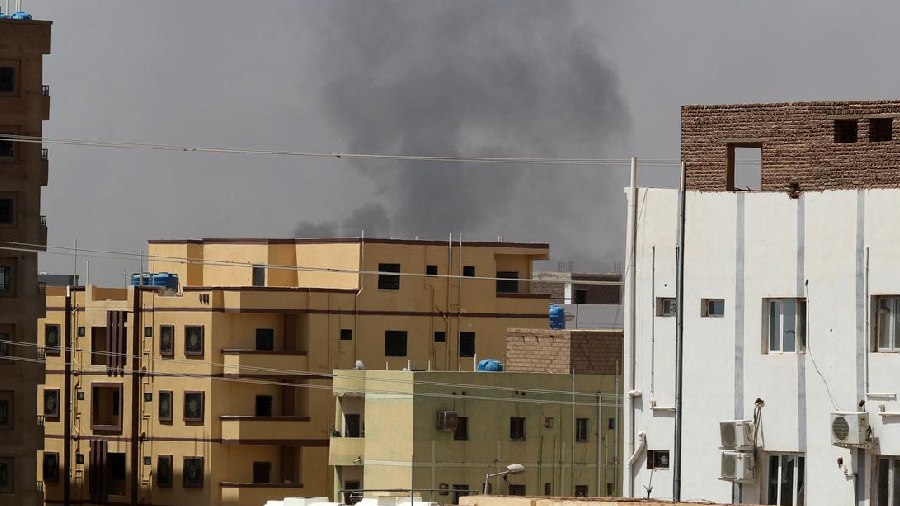At least 56 people have been killed as Sudan's armed forces (SAF) battled the paramilitary Rapid Support Forces (RSF) for control of the country, according to the Sudanese Doctors' Union.
The doctor's syndicate also said 595 people were wounded in the fighting that broke out on Saturday.
Fighting continued well into the night in the capital Khartoum and other parts of the country after months of tensions erupted between two rival military leaders.
The sound of heavy firing could be heard as the military urged people to remain inside their homes. Schools, banks and government offices would be closed on Sunday.
Both sides claim they control key airports and other installations.
United Nations Secretary-General Antonio Guterres spoke to the military leader Abdel-Fattah Burhan and RSF leader General Mohamed Hamdan Dagalo, calling for an immediate end to violence and a return to dialogue.
Burhan overthrew long-term ruler Omar al-Bashir in April 2019. Eighteen months later, the military and the RSF staged a second coup, upending a transition to democracy.
Disagreements between Burhan and Dagalo over the planned integration of the RSF into the regular army have now turned into open conflict.
The armed forces, on its Facebook page, declared Dagalo a "wanted criminal" and the RSF a "rebel militia," saying there "will be no negotiations or talks until the dissolution" of the group.
In an interview with Qatari broadcaster Al Jazeera, Dagalo accused Burhan of starting the battle by surrounding RSF troops. "This criminal, he forced this battle upon us," he said.
Air strikes reported in Khartoum's sister city Omdurman
The Sudanese military has carried out air strikes on a base belonging to the paramilitary Rapid Support Forces in the city of Omdurman, eyewitnesses told the Reuters news agency.
The military said its troops had seized all RSF bases in Omdurman, but DW could not independently verify this.
Omdurman is close to the capital Khartoum.
Even before the air strikes, the Sudanese Doctors' Union reported that four people were killed in fighting in the city.
Amal Mohamed, a doctor in a public hospital in Omdurman, described, "fire and explosions are everywhere."
Sudanese air force calls on citizens to stay indoors
The Sudanese air force called on citizens to stay indoors as they conducted operations in the areas controlled by the Rapid Support Forces (RSF).
Fighter jets were seen flying overhead on Saturday.
The military said it launched strikes from planes and drones at RSF positions in Khartoum.
Khartoum International Airport was closed, and major international airlines suspended their flights to Sudan.
One eyewitness told Reuters they could hear sounds of explosions near the airport late on Saturday.
Fighting in Sudan is 'worst case' scenario
Fighting between the two groups was the worst-case scenario, Isma'il Kushkush, a journalist who watched their power struggle, told DW.
"This is the worst-case scenario that the Sudanese had hoped would never happen as they hoped for a transition into democracy after the 2019 Sudanese Revolution."
After Sudanese protesters toppled the regime of Omar al-Bashir in 2019, an agreement was made on transitioning the country into a democracy. It included both the military and the RSF, Kushkush said.
"That agreement – there were a number of issues that were to be dealt with – including justice and accountability… and the removal of the hands of the army and the Rapid Support Forces in the Sudanese economy. These were among the major issues."
"But really the major issue between these two groups is the issue of command. Does the Rapid Support Forces come under the direct command of the army?"
"There were many in the Sudanese army that were distrustful, that were discontent of the power of the Rapid Support Forces that didn't have the same traditional military training that the Sudanese army has."
This is one side of the story, Kushkush said.
"The other side is that many see that there are elements within the Sudanese army that still have connections to the old government of Omar al-Bashir. There was a great deal of politicking between both sides and the civilians on how to transition."
Diplomats calls for end of hostilities and return to dialogue
The conflict has been widely condemned internationally, with the United Nations, the European Union, and the African Union calling for an immediate end to the hostilities.
UN Secretary-General Antonio Guterres spoke with Burhan and Dagalo and appealed for a return to dialogue.
The European Union's top diplomat, Josep Borrell; the head of the African Union Commission, Moussa Faki Mahamat; the Arab League chief, Ahmed Aboul Gheit, all called for a cease-fire and for both parties to return to negotiations.
The Arab League, following a request by Egypt and Saudi Arabia, was scheduled to hold an urgent meeting Sunday to discuss the situation.
In a joint call, Saudi, US, and UAE foreign ministers emphasized "the importance of stopping the military escalation," the Saudi Foreign Ministry said.
Meanwhile, the United Kingdom has called an emergency meeting of the UN Security Council on Monday to discuss the situation.












